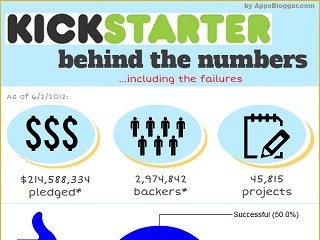Value-based obesity care solution Ilant Health adds $2.5M to its seed round
The company initially raised $3 million in seed funding when it launched in October
Read more...
When someone donates to a Kickstarter campaign, they are obviously taking a bit of a risk since there is obviously always the chance that, for whatever reason, the project might never see the light of day. But what exactly happens to that money if the project ultimately does fail? And who is responsible for the money that was raised? Honestly, that's never been entirely clear to me.
Well, Kickstarter is now making that much more transparent, announcing on Friday that it had updated its terms of use in order to spell out what happens if a successfully funded project fails. And the company wants to make something very clear: yes, legal action can be taken, but not against Kickstarter.
Here is the exact language from the new terms of use, which clearly states that when a person decides to fund a project, they are entering into a contract with the creator of that project. Kickstarter, it says, is just the platform, and nothing more.
"Kickstarter provides a funding platform for creative projects. When a creator posts a project on Kickstarter, they’re inviting other people to form a contract with them. Anyone who backs a project is accepting the creator’s offer, and forming that contract,” it now states. “Kickstarter is not a part of this contract — the contract is a direct legal agreement between creators and their backers."
So what exactly is the creator's responsibility to its backers? Bee honest, have open communication, and return the money if the project is a failure.
The terms of use state that creators have to post updates regarding what work they have done, how they are using the funds, and what, if anything, is stopping them from finishing the project. They also have to communicate a timeline to the backers and "work diligently and in good faith to bring the project to the best possible conclusion."
Creators also have to prove that they used the funds "appropriately" and made reasonable efforts to actually finish the project. Plus they have to have "been honest, and have made no material misrepresentations in their communication to backers."
And, finally, the most important one of all: what happens to the money that was pledged to a failed project. It either gets returned or the project creator has to "explain how those funds will be used to complete the project in some alternate form."
If the project creator does not do these things, Kickstarter says that they may be setting themselves up for potential lawsuits from people who may feel that they have been scammed or lied to.
"The creator is solely responsible for fulfilling the promises made in their project. If they’re unable to satisfy the terms of this agreement, they may be subject to legal action by backers," the terms of use now state.
For Kickstarter the obvious benefit of the new terms of use is that it is pretty much closing itself off to any potential lawsuits from its community. Also, it’s simply good practice to be clear to those on both sides of this equation as to what is expected once a project is successfully funded.
"This update reflects the best practices we’ve seen from our community to get the best possible outcomes from challenging situations," Kickstarter co-founder Yancey Strickler wrote in a blog post. "Incorporating them into these terms is a small but important part of building a healthy, trusted environment where people work together to bring creative projects to life."
One looming question in all of this is how big of a problem actually is for Kickstarter. While the company does break down its stats, including how many of their projects have been reached their funding goals, it does not say anything regarding as to how many actually deliver.
What we do know is that Kickstarter has a 41.12% success rate, with 70,107 of the 177,366 projects launched having been fully funding.
Earlier this year, the company announced that it has reached $1 billion in total pledges. That money came from 5.7 million people. Of that funding, only $157 million went to failed projects.
Even more impressive: half of that total came in just the last year! A total of $480 million was donated by three million people to 19,911 Kickstarter projects in 2013. That included successful projects, unsuccessful projects and live projects.
VatorNews has reached out to Kickstarter for statistics on how many successful projects fulfill their goals. We will update if we learn more.
(Image source:
The company initially raised $3 million in seed funding when it launched in October
Read more...This is the company's first fundraising since 2019 and brings its total capital to $103M
Read more...ROOK lets health, fitness, and wellness companies take data from devices and make it actionable
Read more...


